
Friday, June 19
My friend and I have been talking about kayak camping for more than a year. But something always came up. A few weeks ago, however, we decided to go for it. We would spend four days, three nights kayaking and camping on Lake Roosevelt in eastern Washington. Lake Roosevelt has almost 300 miles of shoreline open to camping, year round. It was perfect. Especially since everything else was closed because of COVID-19.
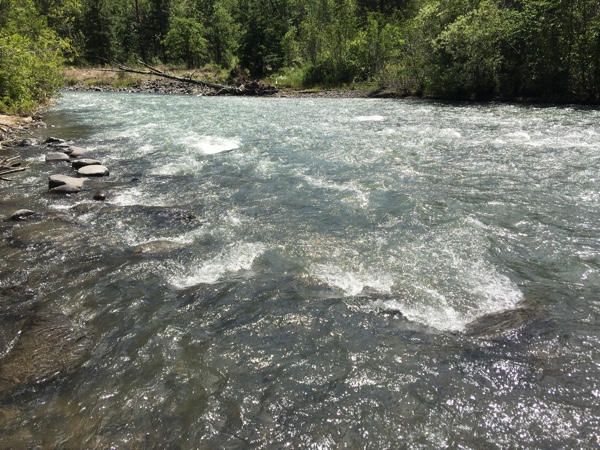 We loaded up our gear on his truck Thursday evening, and he picked me up at my place Friday morning. We were both excited to get going. And, to make the drive more interesting, we would take Highway 12 to Yakima before heading north, instead of the usual I-90.
We loaded up our gear on his truck Thursday evening, and he picked me up at my place Friday morning. We were both excited to get going. And, to make the drive more interesting, we would take Highway 12 to Yakima before heading north, instead of the usual I-90.
It was a beautiful day, absolutely perfect weather. We stopped in Packwood for lunch, surprised to find a restaurant with its dining room actually open. The burgers were fabulous, and we were soon on our way again. Highway 12 is just a two-lane road, so we spent a lot of time stuck behind RVs and 18-wheelers, making the drive pretty slow. My friend said I brought too much gear and it was loading his truck down. I rolled my eyes because I knew I hadn’t and ignored his good-natured teasing. But, we made progress and enjoyed the view, which included several beautiful lakes–Dog, Rimrock, and, of course, Mayfield and Riffe, which we passed earlier.
My friend pulled over for a nap a few hours later while I wandered around in the Tieton River. The cool water felt soothing on my feet and ankles. 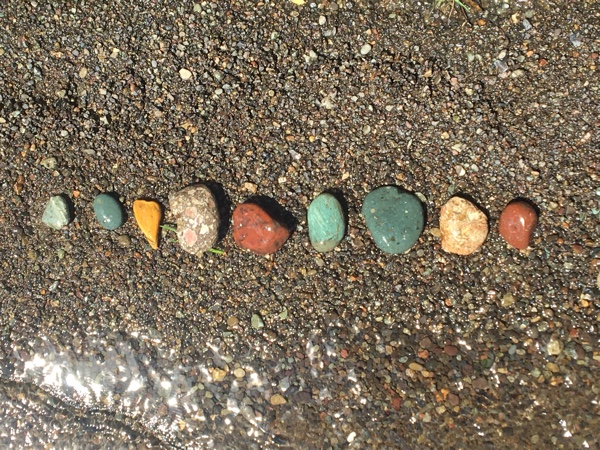 Colorful river rocks beckoned from beneath the clear, swift water. Blue, green, red, yellow, orange, purple, and pink. I scooped up a few for photos and laid them out in a line on the wet sand. I had never seen such beautiful river rocks.
Colorful river rocks beckoned from beneath the clear, swift water. Blue, green, red, yellow, orange, purple, and pink. I scooped up a few for photos and laid them out in a line on the wet sand. I had never seen such beautiful river rocks.
As I returned the rocks to their river, my friend called. His nap had been successful, and he was ready to hit the road again. I noted the time–2:30 p.m.–and that we’d driven only 100 miles in five hours. My friend brushed it off. We had plenty of time. And, we did. We could easily drive the remaining 200 miles in five more hours, which would leave us two hours to paddle to our proposed camp site, about five miles north of the Hunters launch ramp.
Five hours later, we were still more than 50 miles away. I was really concerned about time, but again, my friend brushed it off. But, there wasn’t really anything we could do anyway except continue on. Because of COVID-19, all the campgrounds were closed. The only thing that was open was the Lake Roosevelt shoreline.
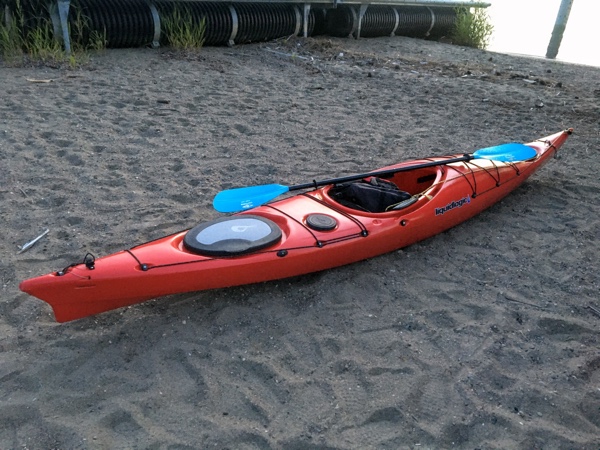 Shortly after 9:00 p.m., as the sun was sinking behind the mountains and almost twelve hours after leaving Olympia, we pulled into the Hunters boat launch. With no moon, night would fall fast.
Shortly after 9:00 p.m., as the sun was sinking behind the mountains and almost twelve hours after leaving Olympia, we pulled into the Hunters boat launch. With no moon, night would fall fast.
We unloaded the kayaks onto the sandy beach next to the boat ramp. My gear was already sorted and packed into dry bags: two clear 20L bags, one with my sleeping bag and pad and another with my clothes; two yellow 8L bags, one with my tent and ground cloth and another with my food; two orange 5L bags, one with snacks and another with my action camera gear; two blue 3L bags, one with my charging gadgets and another with my first aid/emergency kit. Plus, one (non-waterproof) bag with my cook set and two one-gallon containers of water.
The two larger bags plus my tent went into my back storage compartment. It was wet from recent rains, but my dry bags would protect my gear. The other bags went into my front storage compartment. My water went inside the cockpit, at my feet. Everything fit, nice and snug. Fifteen minutes, and I was ready to go. And, although my friend teased me about the amount of gear I brought, it was, in fact, the very same gear I take with me every time I go camping, with the exception of dry bags instead of a backpack. And the two one-gallon jugs of water.
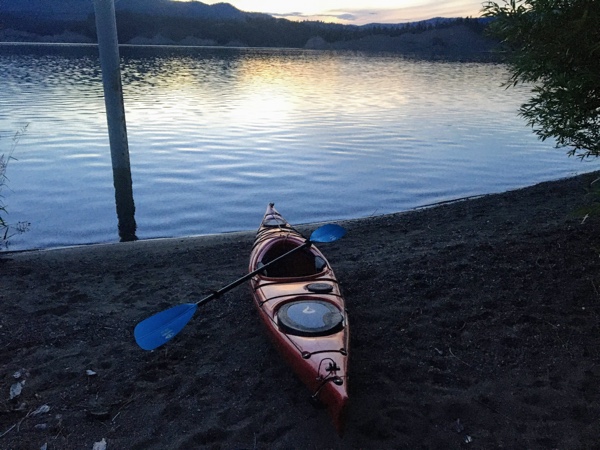 I turned to check on my friend. He had not packed his gear before we left, but rather chose to put what he thought he might want in the back of his truck, with the intention of sorting through it and packing at the launch site. But now, there was no time. We needed to go, and he was having trouble finding his gear. Making the situation worse, he had no dry bags to protect his stuff.
I turned to check on my friend. He had not packed his gear before we left, but rather chose to put what he thought he might want in the back of his truck, with the intention of sorting through it and packing at the launch site. But now, there was no time. We needed to go, and he was having trouble finding his gear. Making the situation worse, he had no dry bags to protect his stuff.
He grabbed a light quilt and an armful of clothes and shoved them in his kayak’s rear storage compartment.
“I’ll take what I need and we can come back for the rest in the morning,” he said.
That sounded like a good plan! We pushed off and headed north, along the shoreline. In the fading light, I thought I could see a potential camping site that would be kinda sorta somewhat a half mile from the boat launch. But, I figured as long as we could get close, it would show effort on our part if the Rangers stopped us.
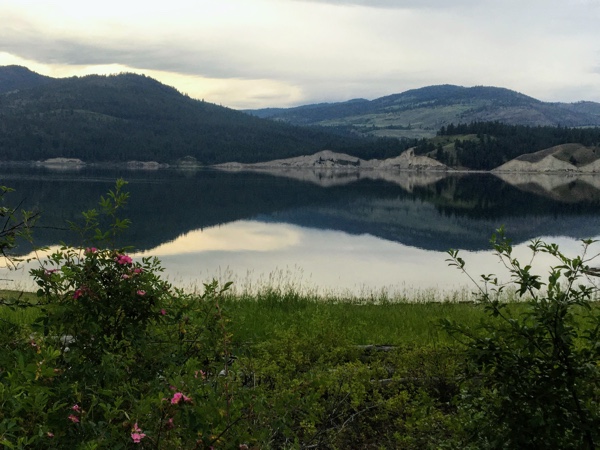 Unfortunately, the beach turned out to be fist-size rocks, rather than sand. And, pretty steep. It would not work for camping. We continued north, around a small point just up ahead.
Unfortunately, the beach turned out to be fist-size rocks, rather than sand. And, pretty steep. It would not work for camping. We continued north, around a small point just up ahead.
This beach looked more promising. Sandy, still with fist-size rocks, but fewer of them and not quite as steep. We might be able to move enough rocks to make it work.
My friend picked a site for his tent, and I picked one higher up on the beach, near the trees. I grabbed some rocks and started moving them out of the way.
“I forgot my tent.”
My friend stood with his hands on his hips, decidedly unhappy with the situation.
Uh oh. This couldn’t get much worse.
“Well,” he said, “I’ll just put my sleeping bag down here and sleep on the beach.”
That did not sound like fun.
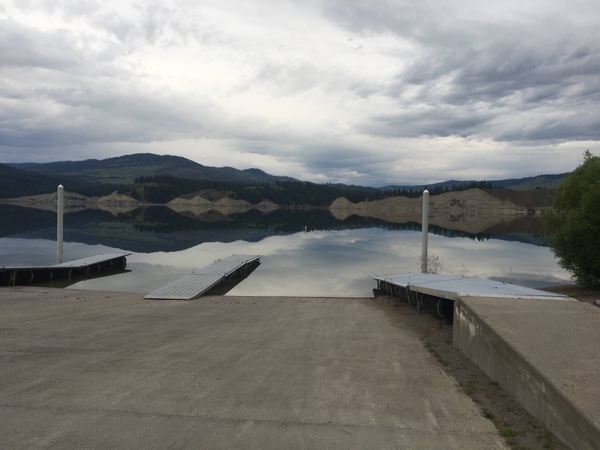 Suddenly, I felt something crawling on my hands.
Suddenly, I felt something crawling on my hands.
I looked down. Thousands of tiny ants, everywhere. Even in the dimming light, I could easily see the swarm. Oh, crap! It just got worse.
I picked another spot by the water line. Again, thousands of tiny ants. This place was an ants nest.
“OK,” I said to my friend. “We can’t stay here. Let’s go back to the truck and get your tent. And, let’s take another look at the beach along the way. Maybe we can find a spot closer, but still far enough away to not piss off the Rangers.”
My friend nodded. He was clearly unhappy. And tired.
We checked out the beach on the way back. Unfortunately, the only spots good enough for camping were far too close to the boat launch. Getting caught camping too close could mean a huge ticket, and I wasn’t willing to take that risk.
My friend went for his gear while I retrieved my headlamp from my front storage compartment. He returned a few minutes later as I was securing my hatch cover.
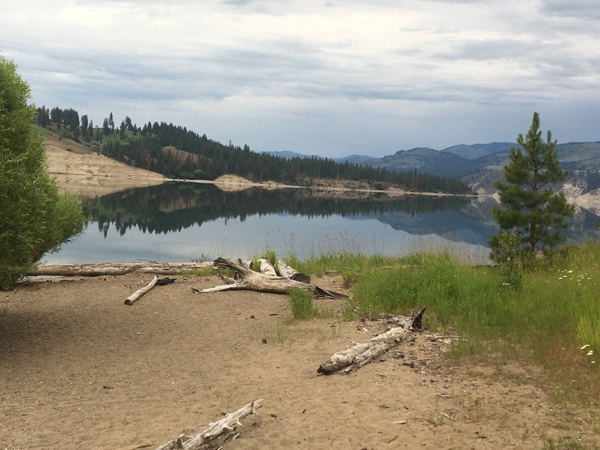 “I’ve never used my tent. I don’t know how to set it up, so I’ll have to use this tonight instead.” He held up an army poncho. I have to admit I was surprised at his lack of preparedness. His gear was unpacked, unprotected, and untested.
“I’ve never used my tent. I don’t know how to set it up, so I’ll have to use this tonight instead.” He held up an army poncho. I have to admit I was surprised at his lack of preparedness. His gear was unpacked, unprotected, and untested.
We pushed off and headed south. But, we didn’t get too far when our paddles started hitting mud, even though we were still 50 yards or so off the shore. This wouldn’t work.
By this time, we’d wandered around for more than an hour, trying to find a place to camp. It was pitch black by now, and we couldn’t see anything anymore. And, I knew my friend was tired and hurting. It was time to end this.
“Let’s go back to the truck,” I said. “We can spend the night in the truck and try again in the morning.”
“We’ll be in big trouble if the Rangers catch us,” he responded.
“We’ll deal with it,” I said. “It’s not safe for us to be out here anymore. We’ll just explain what happened. We tried. It’ll be OK.” I figured it would be better to be caught sleeping in the truck at the boat launch than camping illegally on the beach.
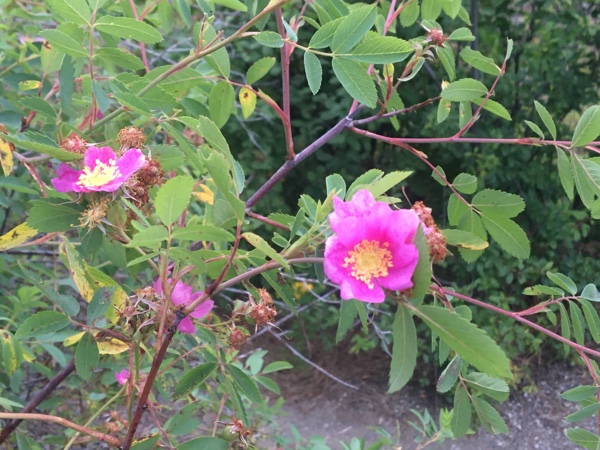 He agreed, and we headed back. Fortunately, the launch had one light, enabling us to find it in the dark.
He agreed, and we headed back. Fortunately, the launch had one light, enabling us to find it in the dark.
We pulled our kayaks up onto the sand. I secured mine to a log, grabbed the dry bag with my camera gear, and followed my friend to the truck. He decided to sleep in the back where he could lay down. I stretched out in the passenger’s seat and covered myself with an army blanket.
It wasn’t a comfortable night. My friend’s back hurt, and he tossed and turned constantly, trying to find relief. I listened to his moans, feeling helpless because I couldn’t do anything and unable to sleep because of the truck’s rocking. All we could do was wait until morning.
I got up at 1:00 a.m. and went back to check on him and encourage him to try to sleep up front. He said he couldn’t sleep sitting up and chose to stay in the truck bed.
Honestly, at this point, I didn’t see any point in trying to continue this trip. If he couldn’t get comfortable using his sleep system in the back of a pickup, then he was not going to be comfortable sleeping on the cold, hard, lumpy ground. I suggested we pack up as soon as the sun came up and head home. There was no point continuing his misery.
And that’s what we did. At 5:30 a.m., we tossed our gear in the back of the truck and loaded our kayaks onto the roof. In the process, my friend discovered his kayak had a small leak. It wasn’t big enough to affect day trips, but it was for a camping trip when you don’t have dry bags. I momentarily thought about swapping gear, but my kayak storage compartment was wet, too. His stuff could no more go in my kayak than in his.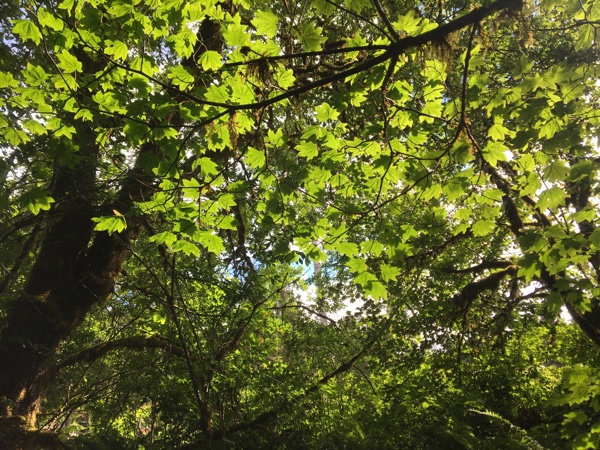
Plus, it started to rain. My friend hates rain. Mother Nature just insisted on kicking him when he was down.
I drove most of the way home while he slept in the passenger seat. This time, the drive took eight hours, including a one-hour stop for breakfast. Again, we were fortunate enough to find a restaurant with an open dining room.
As soon as I got home, I stashed my gear, hopped in Big Red, and headed out to River Song.